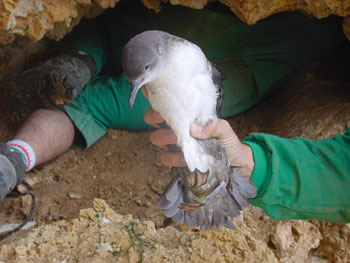Anthony Bicknell (Marine Biology and Ecology Research Centre, Plymouth University, UK) and colleagues, writing in the Journal of Applied Ecology have reviewed the likely effects of planned reductions in European fishery discards on scavenging seabirds, including on the ACAP-listed Balearic Shearwater Puffinus mauretanicus.
They conclude that “Balearic shearwaters may be able to use a range of different fish in the face of a discard ban – stable isotope data indicate that they switch from pelagic fish to discards between incubation and chick-rearing. However, interannual variability in breeding performance has been related to the availability of both small pelagic fish and trawler discards, indicating that this critically endangered species may be negatively impacted by a discard ban.”
The paper’s summary follows:
“Upcoming reform of the European Union (EU) Common Fisheries Policy will be the biggest change in European fisheries management for a generation. A central plank of this reform is a proposed ban on discards, to aid the creation of economically and environmentally sustainable fisheries. This, together with a global trend for declining discards, may have unforeseen knock-on consequences for the large number of scavenging seabirds that consume this plentiful subsidy.
2. Discards have shaped many aspects of seabird foraging, distribution and population dynamics. Here, we review these effects and consider the potential for both negative and positive impacts of discard reforms for seabirds, with particular focus on the EU, and propose recommendations for ongoing research and conservation.
3. EU seabird scavengers are dominated by a relatively small number of large generalist taxa. Many of these occur at globally significant numbers within the EU, but may be able to buffer a decline in discards by switching to feed on alternative foods.\
4. A discard ban may have negative consequences by creating a food shortage for scavenging birds. Some species may offset this by feeding more on other birds, with potentially negative population-level impacts, or by moving into novel environments.
5. Benefits of a discard ban may be a reduction in seabird bycatch in fishing gears, as well as a reduction in populations of large generalist species that currently dominate some seabird communities.
6. Synthesis and applications. Reform of the Common Fisheries Policy and global discard declines are essential components towards creating sustainable fisheries, but may have both detrimental and beneficial effects on seabird communities. The nature of these impacts is still poorly understood, highlighting the need for detailed long-term seabird monitoring, as well as building resilience into populations through policy measures that incorporate remedial action on major seabird conservation priorities. Research should focus on understanding how seabird foraging, in terms of functional responses and searching behaviour, is influenced by both changing discards and natural fish prey availability, and how they impact upon fitness. It is also essential to link individual-level responses with population-, community- and ecosystem level change. Understanding these links is fundamental to ongoing seabird management and conservation, and an ecosystem-based approach to fisheries management.”

Balearic Shearwater in the hand. Photograph by Daniel Oro
Reference:
Anthony W. J. Bicknell, A.W.J., Oro, D. Camphuysen, C.J. & Votier, S.C. 2013. Potential consequences of discard reform for seabird communities. Journal of Applied Ecology doi: 10.1111/1365-2664.12072.
John Cooper, ACAP Information Officer, 03 May 2013

 English
English  Français
Français  Español
Español